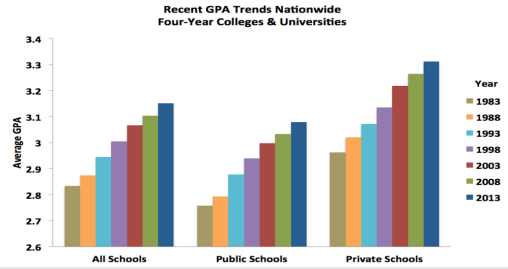In my last post, I mentioned dropping out of college and being ill-prepared and requiring remedial coursework as problems in Higher Education. But, an equally large problem is grade inflation. There has been significantly higher grades given out over the last 3 decades as in the past. Higher grades are granted for “signaling” purposes. Signaling is a word we hear a lot of these days. It is meant to imply that students who graduate college are more capable, and this “signals” to employers that they are better candidates. The signaling word distresses me a great deal. No longer do we attend college because we want to learn deeply. Instead, it is to “signal’ to employers that we have basic skills – probably skills that should have been learned in high school.
In the past, people attended college because they wanted to learn extensively in one area, and in most cases a job in their field was waiting for them when they graduated. The courses were hard, and the students worked hard, so employers knew they could invest in the training and developing of those graduates. Because they had a passion and interest in the field, the graduates would truly enjoy what they would be learning and doing. Unfortunately, this is no longer the case.
When I got my first job as a technical writer, I had a strong English background and so did the other technical writers who were hired right out of college. (This was in the early 90’s) For our first two years on the job, we were labeled a Technical Writer 1, and we were assigned only the easiest level of work. The work mostly consisted of editing existing documents that someone in the company had red-marked in to change. Next you advanced to a Technical Writer 2 and would do some new writing but mostly to existing documents. As a Technical Writer 3, a Senior – about 5 years on the job, you would be writing whole new documents and manuals from scratch.
In my experience, this is no longer the case with most companies. They simply will not hire you without experience, and even internships are not enough to get a good position. Employers will not take the chance to hire, develop, and train someone that they can’t be sure has the knowledge or passion to do the job. The solution is obvious. Get rid of the grade inflation and start grading again on a bell curve – 10% A’s, 20% B’s, 40% C’s, 20% D’s, and 10% F’s. It will “signal” to employers that you truly learned and enjoyed the courses. When I went to school, a C was considered average. A C should signal that you are a capable learner, while a few As and Bs scattered on your transcript shows you have truly learned and enjoyed the material.
When you have to have had an internship or work experience in order to get a job right out of college, something isn’t right. We are going to college for the wrong reasons. We have to get away from going to college to signal to employers that we have basic skills. If you don’t want to learn deeply in a field, then you should start out with a 2-year degree, and it should be hands-on with real skill-development. This will be much cheaper and much more practical for employers. More people should obtain 2-year degrees. They can always get a Bachelor’s Degree in the future, when they are more motivated, sure of what they want, and willing to work hard. With a drop-out rate in 4-year schools as high as we have now (40%), it is obvious that traditional college is not working for most people. Should we continue to expand funding for something that has such a low success rate?
Chris Bernat is the author of Individualized Learning with Technology – Meeting the Needs of High School Students – a book about how learning can be individualized for high school students, and continuing throughout life,

